Edition: 6 to 17 May 2024
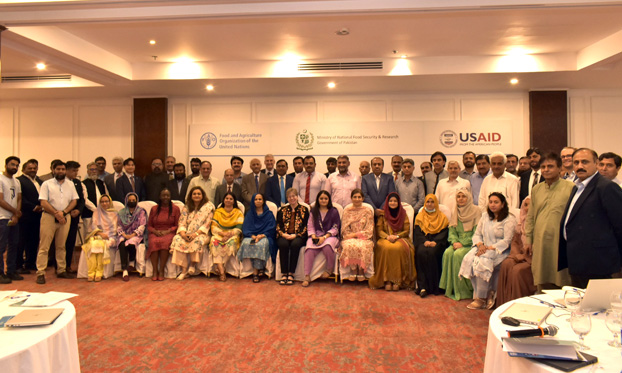 ©FAO/Shahveiz Hassan | PAKISTAN Technical consultation on Global Health Security Program
FAO in collaboration with United States Agency for International Development (USAID) and the Ministry of National Food Security and Research held a project consultation workshop for the project titled technical assistance for animal health systems to address emerging and priority zoonotic diseases and health threats in Pakistan on 15 May 2024. Representatives from human health, animal health, wildlife and the environment participated in this consultation, which marks a significant step towards a healthier and more secure future by strengthening animal health systems to reduce the risks and impacts of zoonoses, emerging diseases, and bio-threats through a One Health and an inclusive approach. Read the news here. |
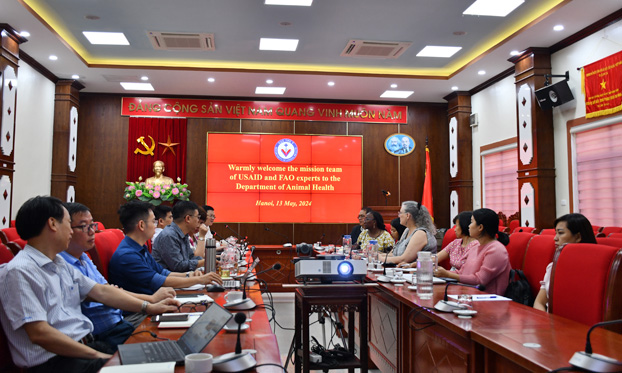 ©FAO//Dung Le | VIET NAM USAID stocktaking in the animal health sector in Viet Nam FAO is collaborating with USAID to assess efforts aimed at strengthening the country’s ability to prevent, detect and respond to zoonotic disease outbreaks. USAID’s Global Health Bureau members visited Viet Nam from 13 to 22 May 2024, to review achievements, identify gaps and plan future activities to enhance the fight against zoonotic diseases in the country. This collaboration underscores a proactive approach to global health security, stressing technical cooperation and continued investment in animal health systems to protect communities. |
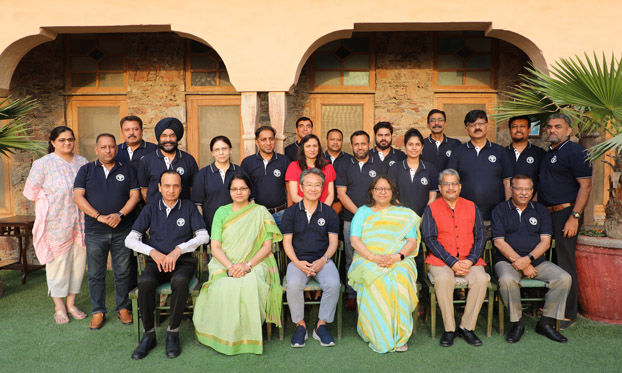 ©FAO/Bushra Owaisy | INDIA FAO and Department of Animal Husbandry and Dairying collaborate to strengthen the animal health sector FAO organized a one-day consultation on 7 May 2024 with senior officials from the Department of Animal Husbandry and Dairying (DAHD) to discuss ongoing and future collaborative initiatives of FAO and the Government of India. The meeting welcomed the highest representation of DAHD, Secretary Alka Upadhayay, Joint Secretary Sarita Chauhan, and Animal Husbandry Commissioner Dr Abhijit Mitra. FAO Representative in India, Takayuki Hagiwara, reiterated FAO’s technical support to the government to address key challenges, promote innovation and ensure the well-being of the country's livestock and poultry industry. |
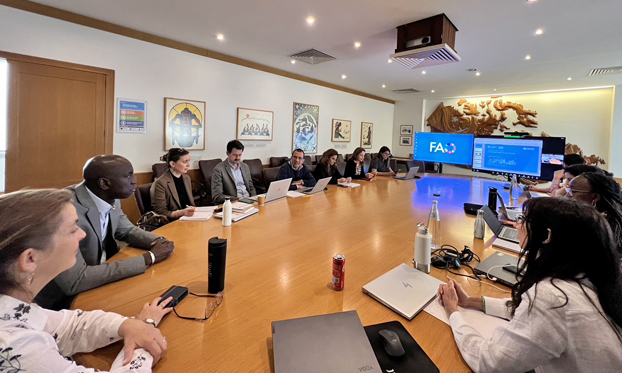 ©FAO/Frank Pumipuntu | ASIA AND THE PACIFIC Participating in the bilateral FAO-USAID Monitoring, Evaluation and Learning meeting FAO RAP participated in the bilateral FAO-USAID Monitoring, Evaluation and Learning technical meeting held at the FAO headquarters from 8 to 10 May 2024. It was organized with the objectives of reviewing last year's data as well as reporting progress and making recommendations for the ongoing fiscal year. Along with providing an opportunity to share monitoring and evaluation inputs from the field with the donors, the meeting also allowed both FAO and USAID to align their understanding on the utilization of information and data collected from the field. |
Learn more about our work on partnerships here. | |
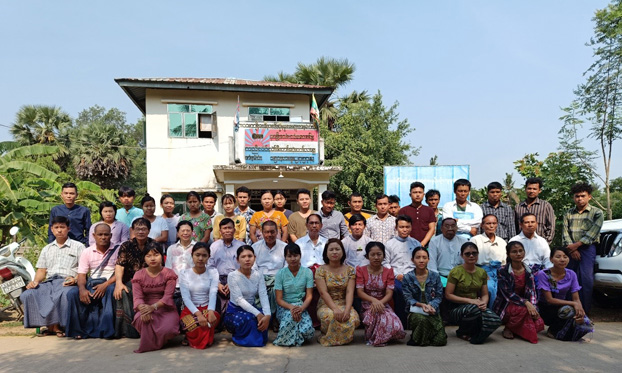 ©FAO/Win Thein | MYANMAR Workshop on biosecurity and good animal husbandry practices FAO conducted a workshop jointly with Myanmar Livestock Federation (MLF) on biosecurity and good animal husbandry practices for small-scale poultry and pig farmers in Einme, Ayeyarwady region on 7 May 2024, thanks to USAID for the support. The objectives of the workshop were to share the basic principles of biosecurity, good animal husbandry practices and primary knowledge on nutrition and feeding management with small-scale poultry and pig farmers, and to raise awareness on disease preventive measures. FAO encouraged MLF to facilitate pig and poultry vaccination at the village level and requested the township veterinary department to provide their technical support.
|
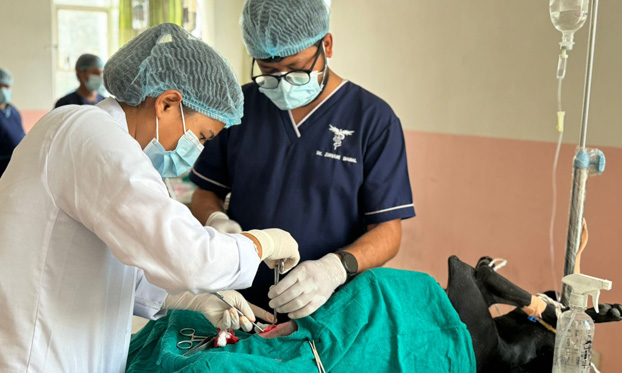 ©FAO/Surendra Karki | NEPAL Hands-on animal birth control surgery training for veterinarians FAO, through USAID funding, conducted a training on hands-on animal birth control for public and private veterinarians in Kathmandu from 15 to 17 May 2024. Sixteen veterinarians participated to enhance their skills in dog population management, supporting the “Zero by 30” rabies elimination target. The training was held in collaboration with the Department of Livestock Services and Central Referral Veterinary Hospital.
|
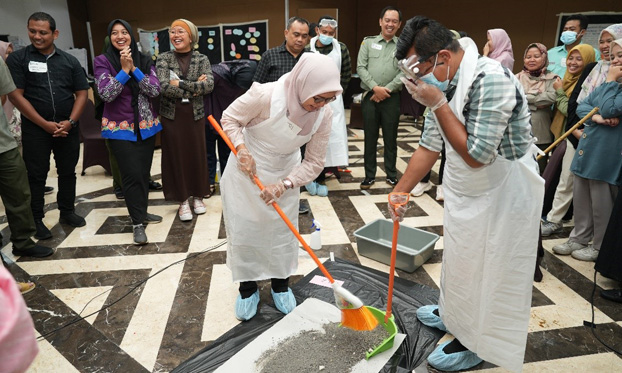 ©FAO/Eko Prianto | INDONESIA Biosecurity training for ruminant farms FAO and the Indonesian Ministry of Agriculture (MoA), supported by the Australian Government, held a training of trainers on ruminant biosecurity in Bogor, from 16 to 17 May 2024. Thirty-two animal health officers from five regions, including the Directorate of Animal Health, provincial, district and Disease Investigation Centers participated. The training covered biosecurity basics, isolation, cleaning and disinfection, gender mainstreaming and a role-play session.
|
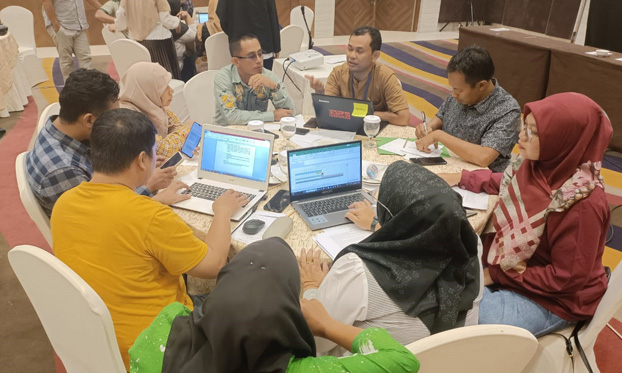 ©FAO/Riana Arief | INDONESIA Outbreak investigation training for foot-and-mouth disease and lumpy skin disease From 13 to 17 May 2024, FAO and MoA, with funding from the Australian Government, conducted refresher training on outbreak investigation for Riau and Jambi provinces. This training aimed to improve rapid detection and emergency response for foot-and-mouth disease (FMD) and lumpy skin disease (LSD). A total of 30 government animal health officers from 22 districts, two provinces and Disease Investigation Center Bukittinggi participated. The training included classroom lectures, group discussions, scenario exercises, sharing experiences and field practice activities.
|
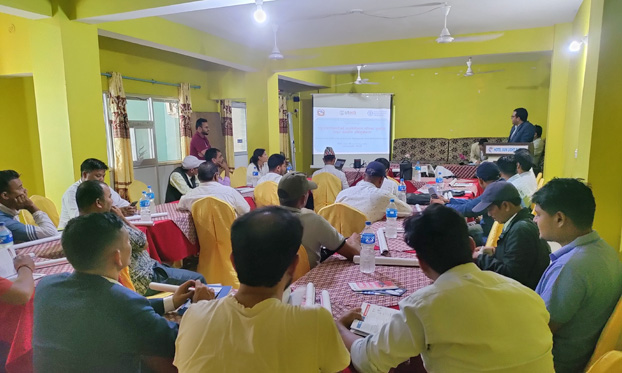 ©FAO/Surendra Karki | NEPAL Orientation on prioritized zoonotic diseases and AMR FAO, supported by USAID, conducted an orientation training on prioritized zoonotic diseases and AMR in Dhangadhi, Kailali on 17 May 2024. Twenty-eight veterinary technicians from 21 local levels of Kailali and Kanchanpur districts, Veterinary Hospital and Livestock Expert Service Centre Kailali and Veterinary Laboratory Kailai participated in the training. The training aimed to build the capacity of veterinary technicians in identifying zoonotic diseases, proper samples for diagnosis and adopting proper biosafety measures. The participants were also provided with information, education and communication materials on rabies, avian influenza and AMR.
|
Learn more about our work on capacity development here.
| |
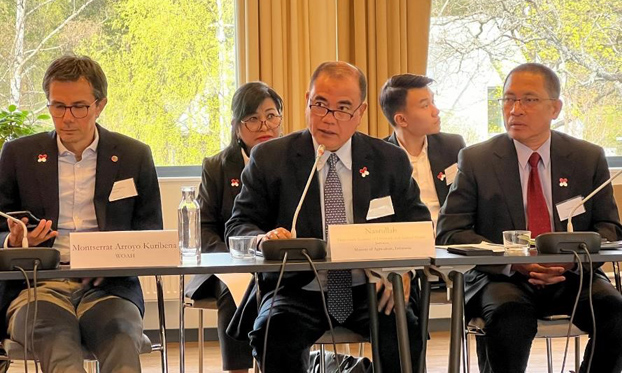 ©Indonesian Ministry of Agriculture | INDONESIA Ninth meeting of the global leaders group on AMR
From 6 to 7 May 2024, Indonesia’s Ministry of Agriculture (MoA) shared their experience in building sustainable farming and efforts to control antimicrobial resistance (AMR) in the livestock and animal health services at the Ninth Meeting of the Global Leaders Group on AMR in Sweden. This event, organized by the Quadripartite—FAO, United Nations Environment Programme (UNEP), World Health Organization (WHO) and World Organisation for Animal Health (WOAH)—gathers global leaders to advise and advocate on AMR issues. The Director-General of Livestock and Animal Health Services MoA emphasized that Indonesia recognizes the magnitude of AMR's impact on global health and the economy; and that the country is committed to control AMR through the One Health approach. FAO was involved in technical support to the presentation as the presentation highlights the years of collaboration between FAO and the government in a collective effort to reduce control AMR under the One Health.Several strategies and programmes have been adopted to control AMR, including the establishment of the National Action Plan for AMR Control, the Multi-Sector AMR Control Task Force and the public-private partnerships programmes. |
Learn more about our work on AMR here.
| |
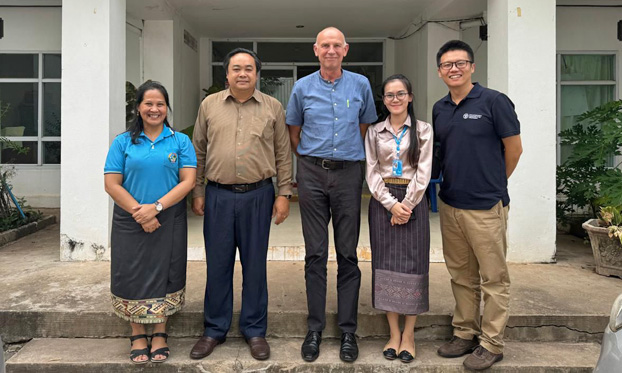 ©FAO/Noutlady Inthavong | ASIA AND THE PACIFIC AND LAO PEOPLE’S DEMOCRATIC REPUBLIC Strengthening veterinary epidemiology capacity FAO carried out a stakeholder scoping for enhancing veterinary epidemiology capacity in the country from 6 to 7 May 2024. This effort aligns with the recent launch of two new projects funded by USAID and Defense Threat Reduction Agency (DTRA), both aimed at strengthening veterinary epidemiology capacities in the country. With two new projects underway, FAO aims to amplify the impact of epidemiology capacity building efforts to enhance the efficiency of the workforce for delivering quality animal health services. A crucial step in this process involves engaging relevant stakeholders to understand ongoing initiatives in epidemiology capacity development and their perspectives. |
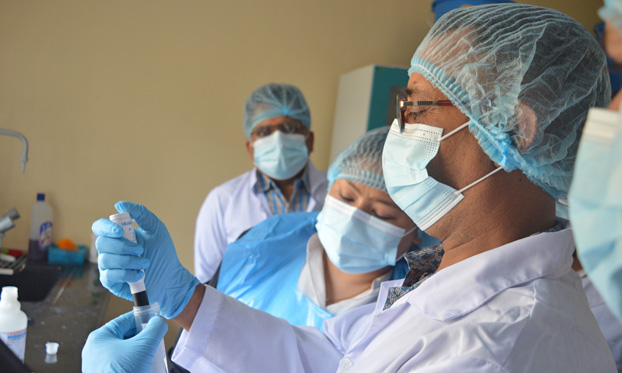 ©FAO/Surendra Karki | NEPAL Training of trainers on sample collection, dispatch and epidemiological reporting FAO through USAID funding held a four-day training of trainers on sample collection, dispatch and epidemiological reporting in Kathmandu from 13 to 16 May 2024. Eighteen laboratory staff from five sub-national veterinary laboratories, FMD and transboundary animal diseases laboratory, Veterinary Standards and Drug Regulatory Laboratory and National Avian Diseases Investigation Laboratory participated. The aim was to equip trainers to conduct field-level training on sample collection and dispatch. The Department of Livestock Services and Central Veterinary Laboratory collaborated in organizing the training. |
Learn more about our work on epidemiology here.
| |
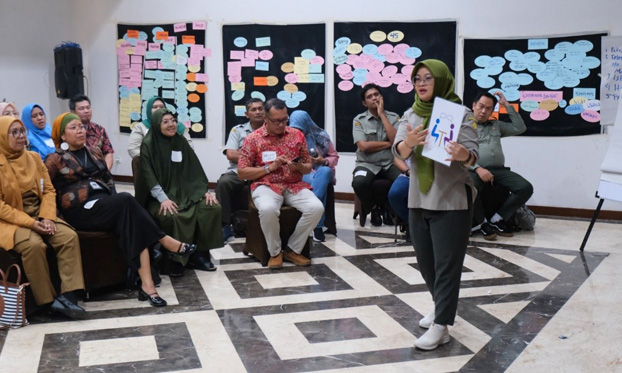 ©FAO/Alia Dwirahmani | INDONESIA Foot-and-mouth disease and lumpy skin disease risk communication training From 13 to 15 May 2024, FAO and MoA, supported by the Australian Government and in collaboration with the Jalin Foundation, conducted a training of trainers on risk communication of FMD and LSD in Bogor. Thirty-two animal health officers from eight provinces, five district governments, seven disease investigation centers and the Directorate of Animal Health were involved in the training. The training covered eleven risk communication modules, focusing on encouraging farmers to apply biosecurity practices on the farm, routine vaccinations and promptly disease reporting. |
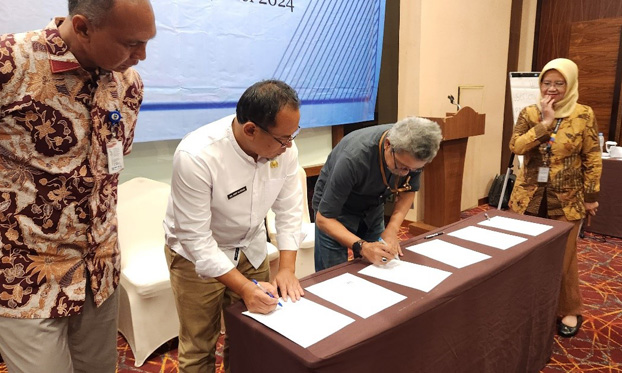 ©FAO/Andri Jatikusumah | INDONESIA Advocacy meeting for TIKOR and TIKORDA formation FAO and the Indonesian Coordinating Ministry for Human Development and Cultural Affairs (CMHDCA), supported by USAID, conducted a hybrid advocacy meeting between 16 and 17 May 2024, to establish and operationalize TIKORDA in West Java province. This efforts aligns with CMHDCA Regulation No. 7 of 2022, which mandates the formation of coordination team (TIKOR) at the national level, and also provincial and district levels (TIKORDA) for zoonotic outbreak prevention and control. The pilot phase will prioritize Sukabumi and West Bandung districts in West Java. |
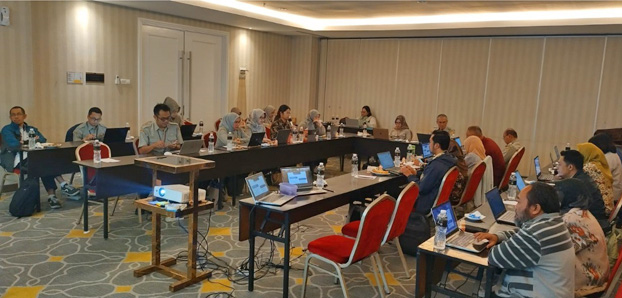 ©FAO/Wahid Husein | INDONESIA Dissemination of official regulations on minimum priority zoonoses services FAO and MoA, with support from USAID, conducted a hybrid meeting on disseminating Minister of Agriculture Regulation No. 39 of 2023 on Minimum Priority Zoonoses Services in Depok, West Java, from 16 to 17 May 2024. Five presentations were delivered during this meeting, including the introduction to Minister of Agriculture Regulation 39/2023 and its four chapters, the policy for implementing minimum service standards for non-natural disasters, nomenclature for disease prevention and control, planning and budgeting for livestock management and zoonosis control, as well as the use of the zoonoses information system and emerging infectious diseases for minimum priority zoonoses services. |
Learn more about our work on risk reduction along the value chain here.
| |
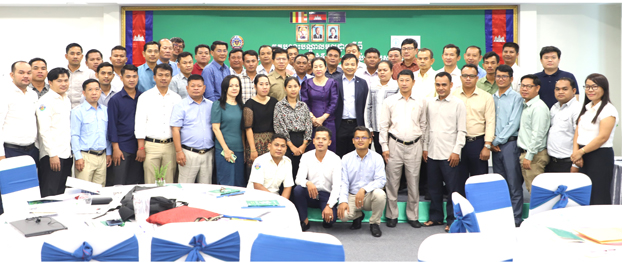 ©FAO/Siheng Ngon | CAMBODIA Basic training on animal disease active surveillance for field veterinary officers With USAID support, FAO and the National Animal Health Production and Research Institute (NAHPRI) of the General Directorate of Animal Health and Production conducted the training on surveillance in Kampot province from 30 April to 2 May 2024. The training brought together 49 officers from the offices of animal health and production from 11 provinces to equip them with basic understanding of field epidemiological applications related to surveillance activities and to improve the interpersonal skills, competencies and confidence of veterinary field officers to carry out the existence FAO and NAHPRI disease surveillance activities.
|
©FAO/Mugyeom Moon | ASIA AND THE PACIFIC AND MALAYSIA Discussion on rumour tracking to enhance disease intelligence FAO shared their experience on rumour tracking and utilization to enhance disease intelligence for animal and public health with the Department of Veterinary Service of the Ministry of Agriculture and Food Security and Division of Disease Control, Ministry of Health Malaysia. This session led to fruitful discussions on the application of rumour tracking activities and potential future collaboration areas between FAO and the Malaysia Government under upcoming projects.
.
|
| Learn more about our work on surveillance here. | |
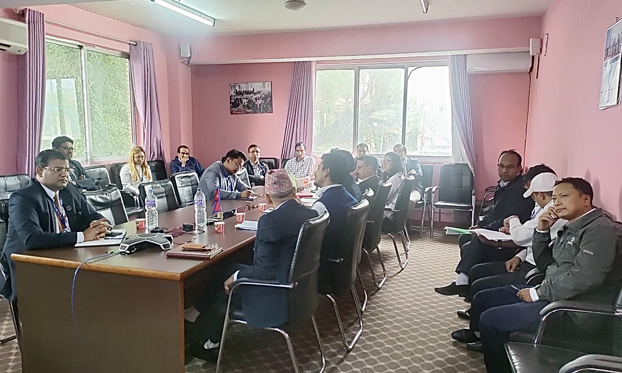 ©FAO/Surendra Karki | NEPAL Multisectoral meeting to review One Health curriculum FAO conducted a multisectoral meeting representing public health, animal health and the environment sector to review the One Health training curriculum between 13 and 16 May 2024 at the Department of Livestock Services. Funded by USAID, the three-day training curriculum covered concepts of One Health and its applications. Experts from training centres of the Ministry of Agriculture and Livestock Development and Ministry of Health and Population were also present in the meeting.
|
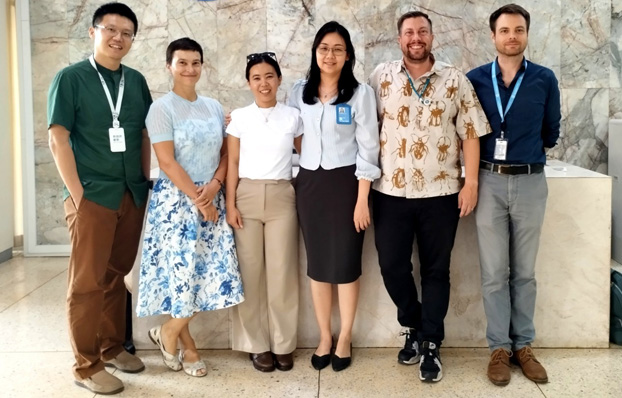 ©FAO | ASIA AND THE PACIFIC The French Agricultural Research Centre for International Development visits FAO RAP The French Agricultural Research Centre for International Development (CIRAP) Animals Health Territories Risks Ecosystems (ASTRE) visited FAO Regional Office for Asia and the Pacific on 9 May 2024. Activities on One Health, antimicrobial resistance and other support on animal health delivered by FAO were introduced to the new One Health expert under ASTRE during the meeting. Potential collaboration was explored in the introductory meeting as well.
|
| Learn more about our work on One Health here. | |
